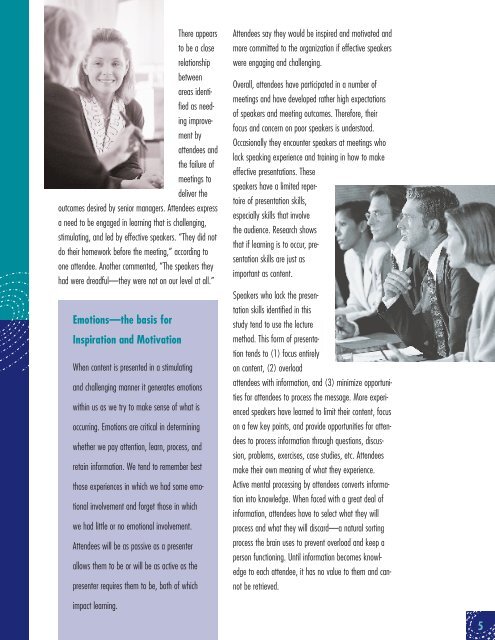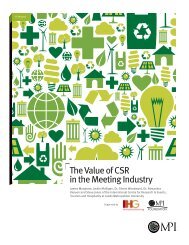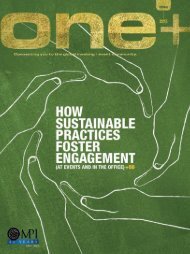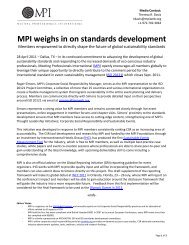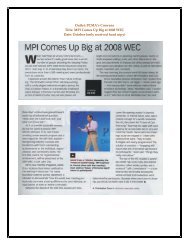1-white paper - Meeting Professionals International
1-white paper - Meeting Professionals International
1-white paper - Meeting Professionals International
Create successful ePaper yourself
Turn your PDF publications into a flip-book with our unique Google optimized e-Paper software.
There appears<br />
to be a close<br />
relationship<br />
between<br />
areas identified<br />
as needingimprovement<br />
by<br />
attendees and<br />
the failure of<br />
meetings to<br />
deliver the<br />
outcomes desired by senior managers. Attendees express<br />
a need to be engaged in learning that is challenging,<br />
stimulating, and led by effective speakers. “They did not<br />
do their homework before the meeting,” according to<br />
one attendee. Another commented, “The speakers they<br />
had were dreadful—they were not on our level at all.”<br />
Emotions—the basis for<br />
Inspiration and Motivation<br />
When content is presented in a stimulating<br />
and challenging manner it generates emotions<br />
within us as we try to make sense of what is<br />
occurring. Emotions are critical in determining<br />
whether we pay attention, learn, process, and<br />
retain information. We tend to remember best<br />
those experiences in which we had some emo-<br />
tional involvement and forget those in which<br />
we had little or no emotional involvement.<br />
Attendees will be as passive as a presenter<br />
allows them to be or will be as active as the<br />
presenter requires them to be, both of which<br />
impact learning.<br />
Attendees say they would be inspired and motivated and<br />
more committed to the organization if effective speakers<br />
were engaging and challenging.<br />
Overall, attendees have participated in a number of<br />
meetings and have developed rather high expectations<br />
of speakers and meeting outcomes. Therefore, their<br />
focus and concern on poor speakers is understood.<br />
Occasionally they encounter speakers at meetings who<br />
lack speaking experience and training in how to make<br />
effective presentations. These<br />
speakers have a limited repertoire<br />
of presentation skills,<br />
especially skills that involve<br />
the audience. Research shows<br />
that if learning is to occur, presentation<br />
skills are just as<br />
important as content.<br />
Speakers who lack the presentation<br />
skills identified in this<br />
study tend to use the lecture<br />
method. This form of presentation<br />
tends to (1) focus entirely<br />
on content, (2) overload<br />
attendees with information, and (3) minimize opportunities<br />
for attendees to process the message. More experienced<br />
speakers have learned to limit their content, focus<br />
on a few key points, and provide opportunities for attendees<br />
to process information through questions, discussion,<br />
problems, exercises, case studies, etc. Attendees<br />
make their own meaning of what they experience.<br />
Active mental processing by attendees converts information<br />
into knowledge. When faced with a great deal of<br />
information, attendees have to select what they will<br />
process and what they will discard—a natural sorting<br />
process the brain uses to prevent overload and keep a<br />
person functioning. Until information becomes knowledge<br />
to each attendee, it has no value to them and cannot<br />
be retrieved.<br />
5


